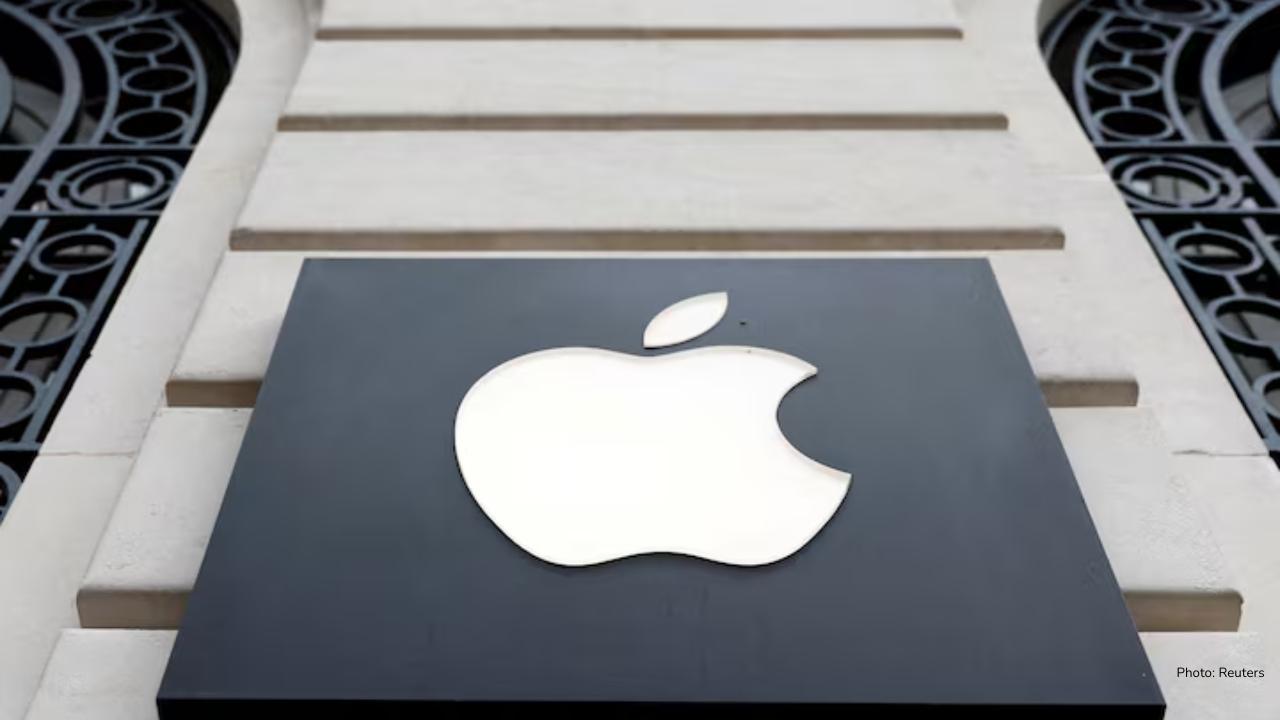
Post by : Monika
Apple Inc., the world-famous technology company known for iPhones, iPads, and Mac computers, has raised serious concerns about a European Union law called the Digital Markets Act (DMA).
On September 25, 2025, Apple asked EU regulators to take a closer look at the law, warning that it may cause delays in new features, increase security risks for users, and create challenges for the company’s operations in Europe.
Apple’s request comes as part of the EU’s ongoing review of the DMA, which is designed to ensure fair competition in the digital market. The DMA mainly targets large technology companies, often called “gatekeepers,” to prevent them from using their size to limit competition or disadvantage smaller companies. While the EU introduced the law to protect consumers and promote choice, Apple believes the rules have unintended consequences for innovation and user safety.
What Is the Digital Markets Act?
The Digital Markets Act is a law passed by the European Union in 2023. Its main goal is to make the digital market fairer for consumers and businesses. Under the DMA, companies considered “gatekeepers” must allow their devices, apps, and services to work with other companies’ products. For example, the law may require Apple to make it easier for its devices to interact with third-party apps and services.
The EU hopes that the DMA will encourage competition and give users more choices. In theory, it ensures that no single company can dominate the market, and it aims to prevent unfair practices such as promoting a company’s own services over competitors. While the law is well-intentioned, Apple believes it may have negative effects that were not fully considered.
Delays in New Features: Apple claims that complying with the DMA has forced the company to delay the release of new features in the European Union. Examples include features like iPhone Mirroring, which allows users to display their iPhone screen on a Mac computer, and live translation features on AirPods,
which help users understand foreign languages in real time. Apple says that the DMA’s requirements make it more difficult to implement these innovations, slowing down the company’s ability to deliver new technology to European customers.
Security Risks for Users: One of Apple’s biggest worries is the risk to user security. The DMA encourages users to install apps from sources outside the App Store, a practice called “sideloading.”
Apple warns that sideloading could expose users to malware, scams, or apps that do not meet strict security standards. The company emphasizes that its App Store is carefully controlled to protect users from harmful software, and allowing external apps could undermine this protection.
Complex Compliance Challenges: Apple also highlights the difficulty and cost of complying with the DMA. Meeting the law’s requirements may involve complex changes to hardware and software, which could be expensive and time-consuming.
The company suggests that some DMA obligations may be unrealistic or hard to implement, potentially affecting Apple’s ability to operate efficiently in Europe.
Apple’s Request to the European Commission
Apple has formally requested the European Commission, which is the EU’s executive branch, to repeal the Digital Markets Act or modify it significantly. The company has proposed that the EU create new regulations that account for evolving technologies, such as artificial intelligence, while still maintaining fair competition.
Apple argues that a balanced approach is necessary. The company believes it is possible to maintain competition in the digital market without forcing potentially harmful practices or slowing down innovation. Apple has also stressed its commitment to providing safe and high-quality products to European consumers.
The European Commission’s Response
The European Commission has responded by emphasizing that companies like Apple must allow their devices and services to work with other products, as required by the DMA. The Commission has stated that compliance is mandatory and not optional. Officials note that the DMA is intended to protect consumers and ensure fair competition across the EU’s digital market.
The Commission is currently reviewing the law to see how it is working in practice. This review includes feedback from major technology companies, smaller businesses, consumer groups, and other stakeholders. The aim is to identify areas where the DMA may need adjustment, particularly in response to new technologies like artificial intelligence and emerging market trends.
Importance of the Review
This review is the first assessment of the DMA since it came into effect. European regulators are looking at whether the law achieves its goals of promoting fairness, preventing monopolistic behavior, and protecting consumers. The feedback from companies like Apple is considered critical because it highlights practical challenges faced by businesses in complying with the law.
At the same time, regulators must balance these concerns against the need to prevent large tech companies from gaining unfair advantages. The DMA is designed to give smaller companies an opportunity to compete and innovate, which benefits consumers by increasing choice and lowering prices.
Apple’s Commitment to Innovation
Despite its concerns, Apple emphasizes that it remains committed to innovation and bringing new features to users. The company asserts that it will continue to develop cutting-edge technology while trying to comply with the DMA. Apple hopes that its suggestions will be taken seriously, allowing it to continue offering innovative products while adhering to fair competition rules.
Apple’s argument reflects a broader challenge for technology companies: balancing regulatory compliance with the need to innovate rapidly. In fast-moving industries, even small delays can affect competitiveness and the ability to meet customer expectations.
Potential Implications for Users
If the EU decides to make significant changes to the DMA based on Apple’s feedback, users may experience faster access to new features and improved security. Apple argues that a more flexible law would allow it to deliver the same high-quality experience to European consumers as it does elsewhere in the world.
However, if the law remains unchanged, European users may see delays in new Apple features, and the company may be required to implement changes that increase security risks, according to Apple. The ongoing review will be important for determining how European consumers and businesses are affected in the long term.
Global Context
Apple is not the only company affected by the DMA. Other large tech companies, such as Google, Facebook (Meta), and Amazon, are also classified as “gatekeepers” and must comply with similar rules. The DMA represents one of the most comprehensive attempts by a government to regulate major technology firms, and its outcome could influence tech regulation in other regions, including the United States and Asia.
The case of Apple highlights a common tension in global technology regulation: how to encourage competition and protect consumers without stifling innovation or creating security risks. Regulators worldwide are observing the EU’s approach closely, as it may serve as a model for future legislation in other countries.
Challenges and Risks
Apple’s concerns underscore the difficulties of regulating complex digital ecosystems. Technology companies must balance innovation, security, and legal compliance, all while operating in multiple countries with differing rules. The DMA illustrates how laws designed to protect consumers can sometimes create unexpected challenges for businesses and users alike.
Experts warn that over-regulation or poorly designed rules could slow technological progress, increase costs for companies, and potentially limit the availability of new features. Conversely, under-regulation could allow monopolistic behavior and reduce consumer choice. Achieving the right balance is critical.
Looking Forward
The European Commission is expected to complete its review of the DMA in the coming months. Stakeholders, including Apple, will continue to provide feedback and engage with regulators. The outcome of this review will likely shape the future of digital markets in Europe for years to come.
For Apple, the review represents an opportunity to influence the law in a way that balances consumer protection, competition, and innovation. For regulators, it is a chance to refine the DMA based on practical experience and emerging technology trends.
Apple’s request to the EU highlights the ongoing challenge of regulating technology in a fast-changing world. While the Digital Markets Act aims to ensure fair competition and protect consumers, Apple argues that some provisions create delays, security risks, and operational difficulties.
The EU’s review will determine whether adjustments are needed to better accommodate technological innovation while maintaining fair competition. For consumers, the outcome could affect the speed and security of new features on Apple devices. For the broader tech industry, it may set an example of how regulators balance corporate concerns with public interest.
As technology continues to advance rapidly, companies, regulators, and consumers must work together to create rules that are fair, effective, and adaptable to the future. Apple’s concerns provide an important perspective in this ongoing discussion.
Apple EU Digital Markets Act DMA tech regulation Apple feature delays EU










Sinner & Swiatek Shine at China Open: Semifinal Spots Secured
Jannik Sinner and Iga Swiatek advance to the semifinals at the China Open. Read about their victori

Michigan church attack kills 4, injures 8 in shocking violence
A gunman drove into a Michigan church, fired shots, set fire, killing 4 and injuring 8 before police

Moldova’s Pro-EU Party Secures Majority in Key Vote
Moldova’s pro-European PAS wins a strong majority in the parliamentary election, weakening pro-Russi

Gabriel’s late header gives Arsenal 2-1 win at Newcastle
Arsenal snatch dramatic 2-1 win at Newcastle as Gabriel heads the winner in stoppage time; Merino eq

Air France Flight 447 Trial Opens 16 Years After Tragic Crash
Sixteen years after the Air France Flight 447 crash, a trial opens against Air France and Airbus. Le

Europe close to Ryder Cup win after strong weekend play
Team Europe is on the verge of winning the Ryder Cup, showing great form in Italy and needing only a